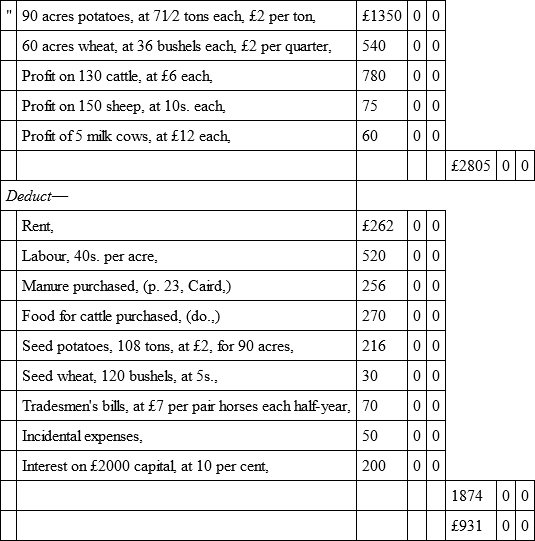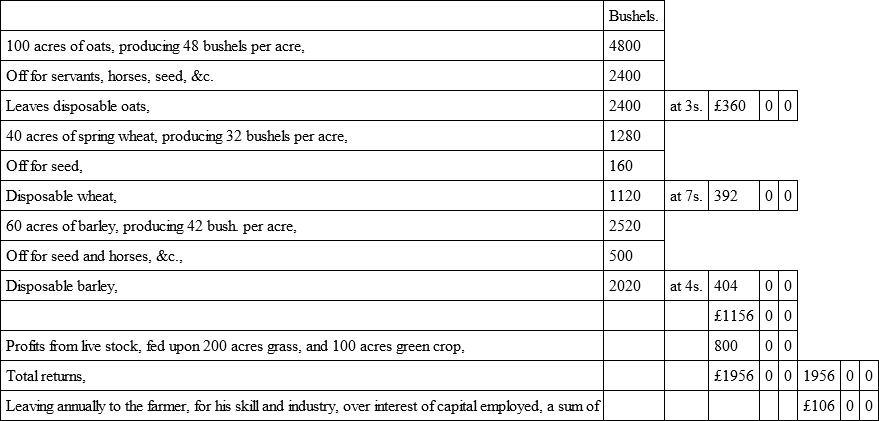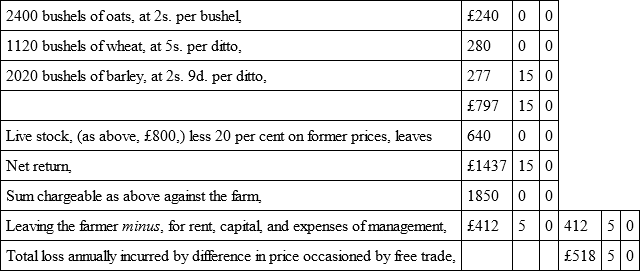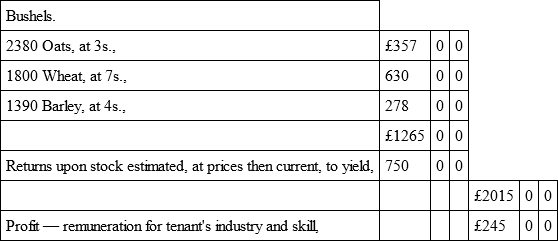 полная версия
полная версияBlackwood's Edinburgh Magazine, Volume 67, No. 411, January 1850
Our belief, as we have said already, is, that the foreigner could afford to go much lower, and that he could furnish us with wheat at little more than 18s. We have stated above an instance of this kind, and, if necessary, we could furnish more. Nor will the statement appear exaggerated to those who will take the trouble of comparing English prices and English burdens, as they existed before the Revolution of 1688, with the prices and rates of the great corn-growing countries of central Europe at the present moment, making due allowance for climate and the difference of social institutions. At the same time, let it be understood that we do not aver, that all the foreign grain which way find its way here can be grown at such low prices. Pomeranian and Bohemian wheat is more expensive in culture than that of Poland; and we know that there is some difference between Hamburg and Dantzic prices. Still our conviction is most decided, that henceforward the foreigner has the game entirely in his hands; that he may prescribe what price he pleases to this country; and that every year, in spite of all efforts, all home harvests, all variety of seasons, prices must inevitably decline. If it were possible that, by high farming, or any other means, we could produce wheat remuneratively at 30s., or 25s., the foreigner would be ready to sell in competition at 25s. or 18s., even supposing he received hardly any profit. His business is to get hold of the British market, and that once accomplished, he may elevate or depress prices as he pleases. The declension will be gradual, but it will be perfectly steady. This year wheat has been brought down to 40s., not in consequence of an exuberant harvest, as in 1835, but through competition. A million of quarters per month have been poured in to sink prices, and we are now debating at home whether British agriculture can go on under such circumstances. Tenants are mourning over their losses; labourers are feeling the pinch of lowered wages; some landlords, in apprehension of diminished rents, are exhorting to further outlay of capital; statesmen are consulting with chemists; and agitators, who have made all the ruin, are shouting for financial reductions. In the mean time, the winter is crawling on apace. The price of grain in Britain has been beat down by competition with a poor foreign crop, for such unquestionably was the yield of 1848. That of 1849 was a splendid one, and, the moment the ports are opened in spring, its influence will be felt. The question will not then be of 40s, but of a price still lower; and we apprehend that, in that event, the argument will be nearly closed. We do not, however, anticipate that the reduction will be rapid. The dealers at the different foreign ports will best consult their own interest by keeping, as nearly as possible, just below the quotations current in the British market. In this way large profits will be secured during the whole maintenance of the struggle, which must end by the British farmer, overloaded with rent, taxes, and public burdens, giving way to his competitors, who, with no such impediments, and with a better climate and richer soil, will monopolise his proper function. We shall then experience in corn, what our West Indian colonists, under the same kind of legislation, have experienced in sugar. The greater part of the soil of Britain will be diverted from cereal growth; and, as the earth does not yield her produce without long wooing, we shall be at the mercy of the foreigner for our supplies of food, at any rates which he may choose to impose.
As to the matter of freights, about which so much was at one time said and written, we need not complicate the question by entering into minute details. From information upon which we can rely, we learn that, at this moment, steamers are constructing for the sole purpose of effecting rapid and continual transit between foreign and British ports, for the conveyance of grain – a circumstance which speaks volumes as to the anticipations of the Continental traders. We may also observe that ordinary freights form no bar to importation, since they are now hardly greater from the Baltic to this country than from Ross-shire to Leith, or from many parts of England to London. One fact, communicated by a correspondent connected with the shipping trade, has peculiarly impressed us. We give it in his own words: "I enclose you a price-current, which will give you the prices of all grain. Grain from America has lately come home, both in American and British ships, at 4d. per bushel freight, and flour at 6d. per barrel – but much more frequently shipped on the condition that, if it leaves a profit, the one half goes to the shipper, and the other half to the owner of the ship for freight." He adds, "The freights from Quebec and Montreal are higher – say 2s. 6d. or 3s. for flour; but as British shipping ceases being protected after 1st January, they will be equally low there." So much for pulling down one interest by way of compensation to another!
The reader – or rather the critical economist – may treat the foregoing remarks as speculative or not, according to the colour of his opinions. All the discussion upon free-trade has been speculative, and so was the legislation also. We take credit for having anticipated what we now see realised; but beyond that, and beyond the facts which the experience of former years has given us, and which we have just laid before our readers, we are, as a matter of course, open to objection, and also liable to error. We have not been arguing, however, without sound data – such as, we suspect, never were brought fully under the eye of our statesmen – and they all tend manifestly and clearly to the same conclusion. That conclusion is, that, without the reimposition of a protective duty, prices cannot rise above the present level. Our argument goes further; for we hold it to be clear that, without some extraordinary combination of circumstances which we cannot conceive, prices must decline, and decline greatly. We look for nothing else; but having had our say as to the future, and pointed out the prospect before us, we shall now confine ourselves to present circumstances, and endeavour to ascertain whether, with a continuance of present prices, and under existing burdens, agriculture can be carried on in Britain at a reasonable profit to the farmer.
Mr Caird's pamphlet, though it has attracted a good deal of attention, contains no hints or information which are new to the practical farmer. Its high-sounding title would lead us to suppose that he had discovered some improved system of agriculture, which might be applicable throughout the kingdom. We read the pamphlet; and we find that it contains nothing beyond the description of a very low-rented and peculiarly-situated farm, the occupant of which appears to have realised considerable profits from an extensive cultivation of the potato. It is not necessary that we should do more than allude to the general tone of the pamphlet, which seems to us rather more arrogant than the occasion demanded. Mr Caird, we doubt not, is a good practical farmer; but we should very much have preferred a distinct and detailed statement of his own experiences at Baldoon, to an incomplete and unattested account of his neighbour's doings at Auchness. A man is fairly entitled to lecture to his class when he can show that, in his own person, he is a thorough master of his subject. A farmer who has devised improvements, tested them, and found them to answer his expectations, and to repay him, has a right to take high ground, and to twit his brother tenants with their want of skill or energy. But Mr Caird is not in this position. He is occupier of a farm of considerable extent, but he does not venture to give us the results of his own experience. It is possible that he may himself pursue the system which he advocates, but he does not tell us so; he points to Mr M'Culloch as the model. This is at best but secondary evidence; howbeit we shall take it as it comes; and as this is strictly a farmer's question, it may be best to allow one practical agriculturist to reply to the views of another. We might, indeed, have abstained altogether from doing so, for Mr Monro of Allan, in a very able pamphlet, entitled Landlords' Rents and Tenants' Profits, has distinctly and unanswerably exposed the fallacies of Mr Caird. Still, lest it should be said that we are disposed to reject, too lightly, any evidence which has been adduced on the opposite side, we have requested Mr Stephens, author of The Book of the Farm, to favour us with his views as to Auchness cultivation. We subjoin them, for the benefit of all concerned.
"On perusing Mr Caird's pamphlet, every practical man must be struck with astonishment at the inordinate quantity of potatoes cultivated at Auchness.
"The entire thirty acres of dried moss, (p. 7,) and twenty-five acres of lea, (p. 15,) were in potatoes in 1848; and the county Down farmer, whose statement is reprinted at the close of Lord Kinnaird's pamphlet, reports that the number of acres occupied by potatoes in 1849 was ninety. This is more than one-third of the whole area of the land. I have considered attentively the calculation made by the farmer; and I think that, in order to meet present prices, it should be modified as below. You will also observe that, in my opinion, the outlay on the farm has been too highly estimated.21

"This balance sheet shows a profit of £931; but as the potatoes are worth £1350, which is no less than £419 more than all the profit, it is evident that it is the potato alone that affords any profit under this instance of high farming. Indeed Mr Caird admits as much when he says, 'The great value of a sound potato crop induces the tenant to adopt such means as will not interfere with the continued cultivation of this root.' The admission is, that the profit rests entirely on the precarious potato. The potato has hitherto been safe in the moss of Auchness, and it is safe there in no other class of soil. In Ireland, even the moss does not save it. There is no high farming in the matter, in so far as manures are concerned, for as much and richer manure is used in the neighbourhood of large towns; and as on the moss at Auchness too much manure may be applied, at least after a certain time, so there may be on other soils; and thus high farming, in reference to soils, just means heavy manuring. Mr Caird says, 'The potato has been grown on the moss land successively, year after year; but the entire reclaimed portions, from being so frequently manured, are becoming too rich, and the crop beginning to show signs of disease, and a tendency to grow to tops rather than roots, which makes it necessary to adopt some plan of reducing its fertility.' It is known to every farmer, that it is quite possible to overmanure any crop, and the effects of overmanuring are, the breaking down of the straw of the grain crops, and the hollowing of the core of the tubers and bulbs of the green crops. The inference then is, that a profit which depends entirely on potatoes is uncertain in any year; and the particular case of Auchness, in which that profit is derived from moss, is not generally applicable to the country, and cannot, therefore, be held up as an example to farmers.
"The farm of Auchness contains nothing remarkable: for although the peculiar culture of the potato in moss is generally inapplicable, there are many farms in Scotland which have moss attached to them. The sea-ware may also be got on most farms on the coast, and where this is the case, it is commonly used. The soil is not good, and is certainly below the average quality; but I cannot understand what is meant by Mr Caird, when he asserts, on p. 7, that the '125 acres of light sandy soil is better adapted for wheat than for barley or oats when in a high state of cultivation,' for, in other parts of the country, such a soil would be eminently suited for barley. The steading is large for the size of the farm, but every steading ought to be made conformable to the farm by the landlord. The system of farming followed by Mr M'Culloch, of having 'no fixed rotation of crops,' is highly objectionable, and Mr Caird, with great propriety, does not commend it; since the farmer who manages so, has no dependence on the amount of crop he may receive any year, and must work according to circumstances, and not on principle, as the unhappy Irish hitherto have done. In this respect, also, Auchness is no example for the country; and, were a regular rotation followed on it, so many potatoes could not be grown, and the profits would be proportionally reduced.
"On the whole, then, I would say that Auchness farming is not generally applicable; and therefore it is useless to proclaim it as an antidote to free competition. For although it is probably true, as Mr Caird says, 'that green crops are likely henceforth to be the main stay of the agriculturists of this country,' yet he must be conscious that he is wrong in recommending, as an example, and as a substitute for protection, the enlarged cultivation of potatoes as a green crop, seeing that their growth has, of late years, been attended with great uncertainty. Is it not a mockery, then, to tell us that our main stay against foreign competition should depend upon a peculiarly uncertain crop? Will his pointing to a moss of 30 acres in Wigtonshire, convince the farmers of this great kingdom, that their future safety, as a class, must entirely depend upon their cultivating such a root on such a soil, in preference to wheat on the fertile loams of glorious old England? I apprehend that such a result is beyond the power of argument."
The non-agricultural reader must pardon us for the insertion of these details. They are necessary for our case, because, if high farming can be made an efficient substitute for protection, we are bound to adopt it, and we should owe a deep debt of gratitude to any one who could point out the way. We are fully alive to the necessity of agricultural enterprise; and, if we thought that our farmers were standing beside their mired waggon, clamorously invoking the assistance of Jupiter, when they should be clapping their own shoulders to the wheel, we would be the first to remonstrate on the heinous folly of their conduct. It is because no amount of personal exertion has been spared, that we seek to enforce their claim according to the utmost of our ability; and, in doing so, we are bound to prove, that no ordinary means which have been suggested for their extrication can be of the smallest avail. Mr Caird has come forward in the character of adviser, and we have stated the opinion of practical men as to the feasibility of his scheme. We have yet more to state, for nature has already denounced his plan far more effectually than opinion. When the county Down farmer visited Auchness in July last, he found more than one-third of the whole farm under potato culture. Upon that crop depended not only the whole profits, but a great deal more. Without the potatoes, there would have been a loss, at a more favourable calculation than his, of £419, on a farm paying only £262 of rent. Since then, we are informed on the best authority, that disease has attacked the potatoes. The highly-manured moss could not preserve from decay, if it did not accelerate it, the uncertain and precarious root. Mr Caird must not quarrel with the penalty he has incurred for having totally misunderstood the nature of the question which is now agitating the public mind. Whilst all others were directing their attention to cereal produce, he kept his eyes obstinately fixed on a little patch of ground which seemed to give unusual facilities for the growth of the doubtful potato. He never attempted to show that, without potatoes, and an exorbitant growth of that vegetable, high farming could pay at Auchness, even with the important elements of very low rent, and singular liberality on the part of an enthusiastic landlord. He perilled his whole case upon the probable returns of a root which every farmer views with suspicion; and – more than that – his statistics, which he wished to be inferred were of universal application, were only applicable to a few remote and isolated spots in Scotland. The result is, that, with all these advantages, the experiment has failed; and that all the liquid manures, economy of dung, guano stimulants, and so forth, as practised at Auchness, cannot, at present prices of produce, force up so much grain, or feed so much stock, as will nearly pay for the required and inevitable expenses. We pass over all possible mistakes. It may have been matter of delicacy for Mr Caird to have exposed the balance-sheet of his neighbour, or he may have assumed, rather hastily, statistics for which he had meagre warrant. We can allow him a large margin. Without potatoes, and such an extent of potato as would be plainly ludicrous if adopted as a general rule, Auchness never could have paid. With potatoes, it has failed in the very year wherein Mr Caird has chosen to exhibit it as a universal model.
So much for the only instance of high farming which has been adduced, as an example of its efficacy in superseding the protective system. In justice to Mr M'Culloch, whom we believe to be a most intelligent farmer, let it not be thought that we presume to call it empirical. On the contrary, we are convinced that that gentleman has acted with great judgment, suiting his management to the nature of the ground with which he had to deal; and that he has made as much of it as any man could do under similar circumstances. He was compelled to deal with a precarious crop, and few men could have dealt with it better: still, his method is no example to others differently situated, nor are his results to be taken by them either as matter of warning or of triumph. It is sufficient for us that Auchness farming, successful or not, is peculiar, and cannot be dragged in as a rule or example for the English or the Scottish farmer. We have enough of high farming statistics to lay before our readers, and, therefore, without any further apology, we dismiss the matter of Auchness, as totally inapplicable to the great question at issue.
In order to arrive as nearly as possible at the true state of the case, in so far as Scottish farming is concerned, we put ourselves into communication with two gentlemen, of the highest eminence in their profession. We need scarcely tell our countrymen on this side of the Border, that it would be difficult to find better testimony on such a subject than that of Messrs Watson of Keillor, and Dudgeon of Spylaw; and we apprehend, moreover, that many English agriculturists are fully acquainted with their character and high reputation. Through their kindness we have been furnished with the statistics of farms situated in the fertile grain-growing districts of Forfar and Roxburgh; and the calculations as to the yield, prices, and expenses, were made from their own books. The rent set down is that which is usual in the district for land of the best description, and the tenant's capital is named at an amount which might enable him to develop the full capabilities of the soil. The estimates have been most carefully framed, with the view of avoiding every kind of exaggeration; and they have been gone over by Mr Stephens, who attests their general accuracy. They are as follows: —
No. IReturns of Produce from a 500 acre farm in Strathmore, county of Forfar, on a five-shift rotation of crops, with an improved stock of cattle and sheep, on an average of years previous to free trade in corn, cattle, &c.; and
Comparative Statement of what may be calculated upon as the returns from the same farm under the present legislative measures affecting British agriculture.

To meet this sum there is the produce of 200 acres of corn crop, and the profits on live stock, (the whole grass and green crop being consumed on the farm.)

Convert the above disposable produce into money, at the present prices, or rather at what may be fairly calculated upon for future seasons, under a system of free trade, and the following is the result: —

Statement of the average Produce of a farm in a full state of productiveness, managed agreeably to the five-shift course, as usually adopted in the south-eastern Borders of Scotland, where the returns of stock form a very considerable means of remuneration, and the price of which, of course, is a material element in the calculation as to the rent to be given.

To meet this sum, there is the produce of 200 acres of grain, in each year, distributed as follows: —

Remain disposable, at the prices on which his calculations were founded and warranted by the rates, as is proved, under protection: —

The above grain produce yields, at the highest average I feel warranted in assuming, under free trade —

We addressed the following circular letter to some of the most eminent agriculturists in Scotland, enclosing copies of the above statements: —
"Edinburgh, 8th December 1849."Sir, – Wishing to publish in our Magazine as accurate a statement as we could obtain of the real condition and prospects of agriculture in Scotland at present, we have for some time been engaged in correspondence on the subject with various gentlemen connected with agricultural pursuits.
"The enclosed statements of the working of a farm, and the quantity and value at present prices of the produce, have been drawn out by Mr Watson, Keillor, Forfarshire, and Mr Dudgeon, Spylaw, near Kelso, assisted by Mr Stephens, author of the "Book of the Farm."
"At the suggestion of Mr – we write to ask whether you will consent to allow us to affix your name to these statements, as attesting their accuracy, to the best of your experience, in farming. If it strikes you that in any of these statements the profits are either over or under estimated, we shall feel greatly obliged by your pointing out where you think the error lies. Any correction you may make we shall submit to the consideration of one or all of the above-mentioned gentlemen, with whose names, as competent judges of the working of a farm, you are probably acquainted.
"We shall feel further obliged by your making any remarks that may occur to you, and stating any facts that have come within your own observation, our only wish being to get as near the truth as may be. The article in the Magazine, into which this attested statement will be introduced, is founded upon the facts that we have been able to gather in the course of somewhat extended inquiries by ourselves, or rather by friends on whose knowledge of agriculture we could safely rely.
"Will you be so good as to send any answer you may think proper to this application, within a week from this date, or sooner if you can, as we have very little time to get everything into order for publication in the January number of our Magazine. – We are," &c.
The following gentlemen have given us permission to use their names, as attesting the accuracy of these statements, to the best of their experience, in farming: —
Mid-Lothian—23
Thomas Sadler, Norton Mains, Ratho.
East-Lothian—
John Brodie, Abbey Mains, Haddington.
Andrew Howden, Lawhead, Prestonkirk.
Peter Ronaldson, Moreham Mains, Haddington.
Wm. Tod, Elphinstone Tower, Prestonkirk.











